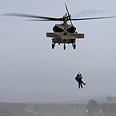
Arab women join IDF rescue units
Young female residents of Kfar Kassem, Kfar Bara enlist in Home Front Command's operational rescue units to the pride of local leaders
Anwar, Rim, Fatma and Wassil reside in Kfar Kassem and Kfar Bara, two villages considered as centers of the Islamist Movement's southern faction. All four serve in two of four Home Front Command companies containing Arab soldiers. Despite maintaining religious lifestyles they don full army uniforms, including helmets over their hijabs.
"It wasn't easy for me to wear the uniforms, but when the ice was broken I realized it was no big deal," 32-year-old teacher and mother of four Wassil said. "I had a problem: I'm religious and don't wear pants. But I agreed to do it for the rescue training and even came home with the uniforms. My children and husband saw me and said 'well done'".
Rim, 21, is a med student and also wears a hijab over her uniform. "I joined the unit since its goal is rescue operations, assisting human beings, helping any person," she explained. She nevertheless admitted that the training period was challenging and arduous.
Fatma, the youngest of the four, 16, is a top student and plans on becoming a doctor. She pledged to continue serving in the unit after being certified. "My parents encouraged me and gave me a lot of support," she said. "My classmates in Kfar Kassem were also intrigued when they saw me in my uniform."
Breaking barriers
Lieutenant-Colonel Salim Wahaba, the Home Front Command's Triangle area chief is the one who came up with the idea to enlist the Arab women to the Kfar Kassem and Kfar Bara companies in 2009. "We broke all the barriers. Not just on the gender level," he said.
"We are implementing National Service."
Wassil noted that when the idea first came up there were hardly any volunteers to be found. "We barely gathered up 50 volunteers," she remembered. "But after we finished training suddenly many asked to join the unit."
Kfar Kassem Mayor Nader Sarsur added that when the notion was first raised he insisted his village's residents would be the first to join.
Mahmoud Assi, Kfar Bara Council head is also proud of his community's involvement in the units. "As leaders we must make decisions and not follow empty statements. IDF uniforms are part of the tools and it doesn't matter what color they are – it's the rescue operations that are important."










